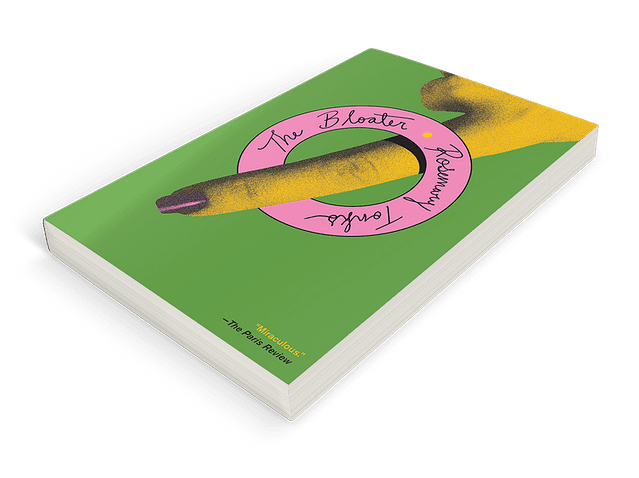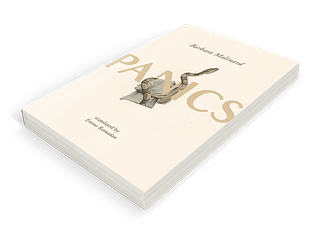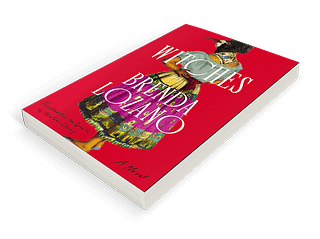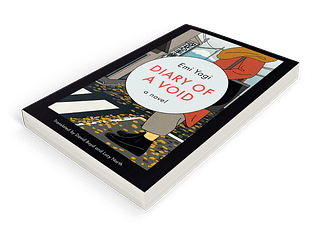
The Bloater
Rosemary Tonks
New Directions, $16
It is often said that there is a thin line between love and hate, but might the visceral provocations of desire and disgust also have something in common? This is the question at the heart of The Bloater, the 1968 novel by British poet and novelist Rosemary Tonks, republished in the US by New Directions this September. Set in London at the height of the Swinging Sixties, the hedonism and sexual politics of the era are recounted through the singular voice of Min, a sound engineer at the BBC who is being pursued by an Opera singer of international repute, an impressive and imposing figure she is equally attracted to and repelled by. Described with derogatory affection as “a black cloud” and a “swelled, salted herring,” Min keeps a running list of The Bloater’s offenses, which include always carrying a wet umbrella, a tiresome routine with wine lists at restaurants, an overpowering body odor, and a tendency to hum. Though she is married, her husband George provides little in the way of an obstacle — he is elsewhere for most of the novel, and even when he is home, his presence is so easily forgotten that in one scene, Min accidentally turns the light off in while he’s still in the room. Her days are consumed by figuring out which potential lovers are worth her time, and a work project that involves reproducing the sound of a human heartbeat to accompany a recording of a poem: it’s these pursuits, far more than her marriage, that command her attention. The central dilemma of the novel might be summed up by Min’s question as she considers two of her suitors: “I’ve got the feeling that one of these two men is a very good lover, but which one?”
Passion and revulsion, tenderness and cruelty, worldly sophistication and schoolgirl naïveté — outside of the classic will-they-won’t-they set-up of an unlikely romantic pairing, it’s Tonks’s embrace of oppositional forces that provides the source of the novel’s tension, as well as its levity. Even The Bloater himself finds a kind of foil in Min’s colleague Billy, a divorced musicologist she becomes increasingly attracted to. The compulsive, madcap momentum of the novel might also have something to do with the speed at which Tonks wrote it, over four weeks in the autumn of 1967, with the intention of making “a lot of red-hot money.” In The Paris Review, Lucy Scholes quotes Tonks on the writing process: “I wrote it like a child writing a diary — it’s the only way to be really humorous.”
One senses that for all The Bloater’s undesirable affectations, it’s his lack of humor, especially about himself, that is the true turn-off for a woman like Min, whose canny observations and strong opinions about love and romance are a large part of her charm for her many admirers, and for the reader. According to Min, sewing is “almost as boring as looking at beautiful views,” and Brahams is good for exercise, “if you’re not in love; if you are in love of course, you will simply swoon off after the first knees bend.” Her self-prescribed cure for obsessing over a new crush? “Something in P.V.C. with a vizor… And ten hours’ sleep every night and a complete ‘don’t care’ kit of cigarettes, records, hair dressing appointments, films, and so on.” On her colleague Jenny’s new lover, a guitarist Min refers to as “that afterparty Orpheus,” she quips: “I can’t understand you. Musicians are usually so narcissistic, they’re simply not worth the candle.” (One can see why she enjoys the company of Billy, who delivers his own deliciously quotable piece of dating advice: “I don’t think one should ever go to bed with someone who bores one in a restaurant”).
It is a line Tonks herself might have delivered at a hip soirée in London, where she lived with her husband Michael Lightband, an engineer and financier, throughout the 1960s, after spending the early years of their marriage in India, Pakistan, and Paris. Like The Bloater’s unconventional leading lady, she was known as a woman of eclectic tastes—a bohemian living in a Queen Anne house in Hampstead. Although she had made her literary debut when she was still a schoolgirl, it was during this time that she began to gain recognition for her experimental writing and sound art. Between 1963 and 1974, she published two collections of poetry — Notes On Cafes and Bedrooms and Iliad of Broken Sentences — in addition to six novels, and collaborated on the experimental sound poem “Sono-Montage” with musician and composer Delia Derbyshire, while also producing poetry programs for the BBC. Those years in London would provide the inspiration for much of her writing and represent the most creative period of her life.
While Min’s escapades, indulgences, and witty one-liners might bring to mind the work of Tonks’s local contemporary Elaine Dundy, or, a few years later and across the pond, self-described L.A. “adventuress” Eve Babitz, the fast-paced repartee and the sexual power struggle between men and women in the novel also recalls the screwball comedies of the 1930s, a genre film critic Andrew Sarris defined as “sex comedy without sex.” There is an obsession with sex in The Bloater — how to get it or how to delay it, how to tell who will make a successful lover, how to maintain the upper hand of the pursued instead of being the one waiting by the phone. In particular, there is a nuanced understanding of the limitations of seeking power through sex appeal as a woman — as Min’s more buttoned-up friend Raquel says, with an unmistakable tone of judgement, “I think careless women have brought down the price of flesh in the last few years.”
But for all the ways Min and her friends endlessly dissect and analyze the rituals of seduction, no sex scenes take place in the present action of the novel. It’s not the pleasures of physical intimacy that energize Tonks’ writing in The Bloater, but the pleasures of language itself. Perhaps this should not be unexpected, considering she was a celebrated poet. Citing Baudelaire and Rimbaud as her most important influences in an interview in 1967, she stated, “The main duty of the poet is to excite—to send the senses reeling.” The work of the writer is, in other words, to arouse.
The joy of reading The Bloater is in the vitality of Tonks’s sentences, which are teeming with sensory particulars and surprising, delightful connections. At work, Min and her colleagues in the airless, soundproofed studio are “sealed in like tinned shepherds’ pie.” Sitting in a seedy pub at lunch with Jenny, the two women eat “harsh cheese sandwiches,” the cheddar so sharp it makes their “gums smart.” When Min tells Billy that his delicate fingers appear cruel, he looks down at them “as though they’d signed away all his money.” Tonks’s most evocative, poetic language is reserved for the city itself, whether describing the many varieties of London rain, the light coming through an avenue of plane trees on a September afternoon — “daylight stained green or amber but always with a flush of rose in it” — or the champagne-sipping crowd at the Opera House in their “musty dehydrated furs” looking like “a ranch of petrified foxes.” The details in The Bloater rarely feel familiar or generic. (Perhaps this is why the few clichés stick out uncomfortably, as when Min describes Raquel’s simpering behavior as “begging to be beaten black and blue,” which also reminds the reader that, no matter how breezy, modern and progressive Tonks’s prose might feel, a novel can never be completely unmoored from the attitudes of its time).
But for all the subversive elements of The Bloater — its playful embrace of promiscuity, the originality of its language — it’s the way it resists the conventional morality of classic literature, refusing to reduce its wayward heroine to a cautionary tale, that strikes me as most radical. Apart from a brief episode of gout, Min is never punished for her transgressions or her vanity or her freedom, and the novel concludes with a swerve towards a romance founded on friendship—a coming together of intellectual equals, as in a Shakespearean play. In this way, Tonks allowed her fictional counterpart to joyfully escape the misfortune and anguish that would plague the writer throughout the rest of her life, giving Min the kind of resolution that can only ever be achieved in fiction: a happy ending.
The “rediscovery” or republication of an author who has slipped from the cultural radar is often accompanied by frustration or speculation about why certain works remain celebrated and taught while others are left to fall into obscurity. It shouldn’t be a mystery that many of these so-called “lost writers” are women — their absence is the result of a literary culture that has historically privileged particular voices at the expense of all others. The revival in recent years of Lucia Berlin, Kathleen Collins and Bette Howland has been a significant and overdue correcting of the record. However, in the case of Tonks, this vanishing act was deliberate, and self-initiated. In the late 1960s, a series of personal catastrophes, including the death of her mother and the dissolution of her marriage of nearly twenty years, sent her on a painful quest for spiritual solace. Over the next decade, Tonks sought guidance from various mystics, healers and gurus until she was hospitalized in 1977 with two detached retinas and almost went blind — an event she believed was triggered by Taoist eye exercises. After her recovery, she converted to fundamentalist Christianity, and, in 1980, left London to return to Bournemouth, where she not only retreated from public view but renounced everything about her former life and identity, including her name. From that point onwards, though she was divorced and her husband had since remarried, she went only by “Mrs. Lightband.” She destroyed her last fiction manuscript in 1981, believing it to be dangerous, and during the same period, incinerated an extensive collection of inherited Asian art and artifacts in her garden, smashing down statues and idols until they were “dog-biscuit size.” She was known to borrow her own works from the library in order to burn them. “What are books? They are minds, Satan’s minds,” she wrote in a notebook in 1999. The disappearance of Rosemary Tonks was so total that after her death in 2014, many expressed surprise that she had been alive for all those years.
It’s the choice of “dog-biscuit size” as a unit of measurement — so precise and unexpected — that moves me most, because it seems not at all like the work of Satan’s mind or Mrs. Lightband’s, but rather the mind of Rosemary Tonks as seen at work in The Bloater, suggesting that some part of her poetic sensibility persisted, despite her best efforts. But like her hero Rimbaud, she abandoned literature altogether and refused to reprint her earlier works, returning to London only for the purpose of handing out Bibles in Hyde Park. The juxtaposition between the life of the celebrated, experimental writer and the reclusive, religious zealot is so extreme that it seems like something only Tonks could have imagined, a turn of events so deeply ironic that it would not have been out of place in one of her novels. As for the The Bloater: it stands as one of the few remaining testaments of a woman who, like her heroine, once lived life on her own terms. In this light, its republication seems a small miracle.


